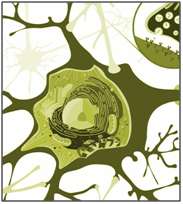CBD – Cannabidiol
Dr. med. Heinz Lüscher
Cannabidiol (CBD for short) is an ingredient of the hemp plant. It is a so-called cannabinoid with interesting medicinal properties. However, CBD does not have a psychoactive effect!

CBD – An exciting ingredient of the hemp plant (cannabis)
The hemp plant, which grows up to four meters high, contains over 100 different cannabinoids. In commercial or industrial hemp, CBD is the cannabinoid with the highest concentration. These legally cultivable varieties contain hardly any THC, which has a psychoactive effect, but a lot of CBD.
CBD does not have a psychoactive effect! Psychoactive substances can cause negative changes in the psyche and consciousness and can affect the perception, thinking, feeling and acting and, especially at higher doses, cause acute poisoning or even have life-threatening effects. However, it has various medically desirable properties and does not cause any relevant side effects even in high doses. The intake is considered to be extremely safe.
CBD in the video
Learn more about CBD and the vital substances it contains in the video with Dr. Heinz Lüscher.
The Endocannabinoid System
While researching plant-based cannabinoids, scientists discovered the endocannabinoid system in the human body. Known as “the body’s own cannabinoid system”, the endocannabinoid system is a subsystem of mammalian nervous systems, that is involved in a variety of physiological processes such as pain sensation, memory management and regulation of the immune system. The neuro- modulatory lipids, or so called endocannabinoids, are substances produced from within the body that activate the relevant Receptors CB1 and CB2, thereby deploying various processes of sending signals throughout neural pathways within any given organic system.
Properties of CBD
It has analgesic properties, it also has anticonvulsant, anti-epileptic, anti-psychotic and anti-anxiety effects. It is further anti-inflammatory and antioxidant. It has nerve-protective properties and is antibacterial against certain germs (MRSA) with high antibiotic resistance and finally inhibits nausea. All this makes it an interesting candidate for the treatment of chronic pain, inflammatory diseases of the nervous system, epilepsy, anxiety disorders ect.

Effects of CBD
It effects the body in many different ways. According to CBD expert, Dr. med. Franjo Grotenhermen, the following mechanisms are among the most important:
Similar to capsaicin*, CBD stimulates the vaniloid receptor type 1 with maximum effect. This explains partially the anti-inflammatory effect of CBD.

- It alleviates inflammatory and neuropathic pain. Such pain-relieving sensation is presumably mediated by glycine receptors while CBD suppresses those chronic pain stimuli.
- It inhibits the body’s own degradation of its neurotransmitter—anandamide, thereby enhancing the cannabinoids concentration in the body. The observed anti-psychotic effects of CBD are co-related to this high-level of anandamide as just mentioned.
- It strengthens the adenosine’s effect in signal transduction. Adenosine is the body’s own substance which blocks the distribution of activated and animated neurotransmitters or messengers in the nervous system. Some of the CBD’s anti-inflammatory effects are based on this mechanism mentioned above. A further reason for its anti-inflammatory effects relates to CBD’s bindings to the GPR55-Receptor—one of the cannabinoid receptors which is likely targeted for treatment of inflammation and pain.
- It is an effective anti-oxidant or a free- radical catcher. It shows that CBD can prevent oxidative damage as effectively as, if not better than, vitamin C or vitamin E.
- It inhibits the replication of certain brain tumor cells (glioma), by evoking their autophagy—a natural mechanism of cell self-destruction.
- Researchers have examined CBD’s preventative effects on cancer for many years. There is some evidence to suggest that CBD may inhibit the growth of new blood vessels in the cancerous tissues.
- It acts indirectly as an antagonist against the agonists (such as THC) of CB1 and CB2 receptors. Therefore, CBD reduces many negative effects and symptoms induced by THC.*A naturel component in cayenne (chilli)
The remarkable fact is that CBD has a very low affinity to the receptors in the endocannabinoid systems. Its effect comes, more than likely, from its capacity to inhibit the clearance of the body’s own endocannabinoids. Thus, by the intake, you may prolong and strengthen the effects of these endocannabinoids.

